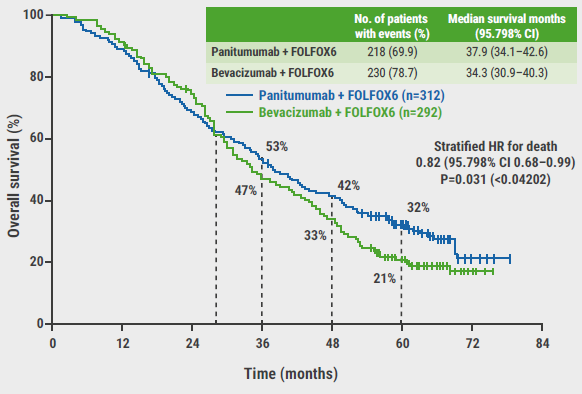https://doi.org/10.55788/b439a2a7
No established standard-of-care exists for patients with recurrent/refractory Ewing sarcoma, because there have not been any randomised trials comparing different chemotherapy regimens in this population. Therefore, the phase 3 rEECur trial, presented by Dr Martin McCabe (University of Manchester, UK), randomised patients with previously treated Ewing sarcoma to ifosfamide (n=78) or topotecan plus cyclophosphamide (n=162). The primary outcome was event-free survival (EFS) [1].
The median EFS was numerically higher in the ifosfamide arm (5.7 months) than in the topotecan plus cyclophosphamide arm (3.5 months) and trended towards significance (HR 0.73; 95% CI 0.51‒1.05). In addition, the 6-month EFS rates were 47% and 37% in the ifosfamide and topotecan plus cyclophosphamide arm, respectively. Interestingly, exploratory subgroup analysis revealed that the effect appeared to be more pronounced in younger patients (<14 years; HR 0.37) than in older patients (HR 0.93). The overall survival (OS) analysis displayed similar results, with a median OS of 15.4 months in the ifosfamide arm and a median OS of 10.5 months in the topotecan plus cyclophosphamide arm, with a trend towards a significant difference (HR 0.73; 95% CI 0.50‒1.08).
The rate of grade ≥3 adverse events (AEs) was higher in the ifosfamide arm (57%) than in the topotecan plus cyclophosphamide arm (44%), mainly due to a higher rate of nervous system (8% vs 3%) and renal/urinary disorders (8% vs 0%) in the ifosfamide arm. In the topotecan plus cyclophosphamide arm, 53% of the patients discontinued due to progression compared with 22% in the ifosfamide arm. However, 26% of the patients in the ifosfamide group discontinued due to AEs but no patients in the topotecan plus cyclophosphamide group did so. Dr McCabe commented that this was a high-dose trial and that dose reductions were not allowed in the ifosfamide arm. In the topotecan plus cyclophosphamide arm, dose reductions were allowed. Finally, quality-of-life data suggested that improvements were made in the ifosfamide arm but not in the topotecan plus cyclophosphamide arm.
- McCabe MG, et al. Phase III assessment of topotecan and cyclophosphamide and high-dose ifosfamide in rEECur: An international randomized controlled trial of chemotherapy for the treatment of recurrent and primary refractory Ewing sarcoma (RR-ES). LBA2, ASCO 2022 Annual Meeting, 3–7 June, Chicago, IL, USA.
Copyright ©2022 Medicom Medical Publishers
Posted on
Previous Article
« Dabrafenib plus trametinib candidates for standard-of-care in BRAF V600-mutated paediatric low-grade glioma Next Article
New standard-of-care for cisplatin-ineligible locally advanced head and neck squamous cell carcinoma »
« Dabrafenib plus trametinib candidates for standard-of-care in BRAF V600-mutated paediatric low-grade glioma Next Article
New standard-of-care for cisplatin-ineligible locally advanced head and neck squamous cell carcinoma »
Table of Contents: ASCO 2022
Featured articles
Breast Cancer
Sacituzumab govitecan meets primary endpoint
Shaky OS results of palbociclib in ER-positive/HER2-negative breast cancer
Practice-changing results of T-DXd in HER2-low breast cancer
SET2,3 to inform on chemotherapy decisions in ER-positive breast cancer
Metastasis-directed therapy fails in oligometastatic breast cancer
Analysis by residual cancer burden further clarifies effect of pembrolizumab
Contribution of metastatic therapies on mortality reduction in breast cancer
Radiotherapy may be omitted in breast cancer patients
Promising data for ribociclib after progression on ET plus CDK4/6 inhibitors in HR-positive/HER2-negative metastatic breast cancer
7-gene biosignature: Benefits of endocrine therapy and radiotherapy in breast cancer risk groups
Lung Cancer
Additional tiragolumab does not help patients with untreated small cell lung cancer
Success for serplulimab plus chemotherapy in small cell lung cancer
Adagrasib safe and clinically active in non-small cell lung cancer
Long-term benefits of combined immunotherapy over chemotherapy in non-small cell lung cancer
Effect of KRAS mutations and PD-L1 expression on therapy response in non-small cell lung cancer
Melanoma
First results on distant metastasis-free survival in stage II melanoma
Higher response rates for concurrent triple therapy versus sequential therapy in melanoma
Genitourinary Cancers
Exploratory treatment options fail in ccRCC
Adjuvant everolimus did not benefit high-risk renal cell carcinoma
Cabozantinib fails as first-line maintenance therapy in urothelial cancer
177Lu-PSMA-617 is a valid treatment option for PSMA-positive mCRPC
Enzalutamide performs well in metastatic hormone-sensitive prostate cancer
Haematologic Malignancies
Autologous stem cell transplantation plus RVd improves PFS in multiple myeloma
Novel first-line treatment option for mantle cell lymphoma
Promising results for novel CAR-T therapy in relapsed/refractory multiple myeloma
Gastrointestinal Cancers
Panitumumab beats bevacizumab in RAS wildtype left-sided metastatic colorectal cancer
Spectacular results for dostarlimab in mismatch repair deficient rectal cancer
Triplet chemotherapy beats doublet chemotherapy in colorectal cancer liver metastases
To resect or not to resect primary tumours in stage IV colon cancer?
Novel treatment option for KRAS wildtype pancreatic cancer
Gynaecological Cancers
Primary results of rucaparib in ovarian cancer
Trabectedin not superior to chemotherapy in recurrent epithelial ovarian cancer
Encouraging results of relacorilant in ovarian cancer
Miscellaneous Topics
Bacterial decolonisation effective against radiation dermatitis
New standard-of-care for cisplatin-ineligible locally advanced head and neck squamous cell carcinoma
Ifosfamide is likely to be the go-to therapy in recurrent Ewing sarcoma
Dabrafenib plus trametinib candidates for standard-of-care in BRAF V600-mutated paediatric low-grade glioma
© 2024 Medicom Medical Publishers. All rights reserved. Terms and Conditions | Privacy Policy


